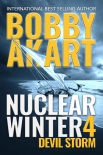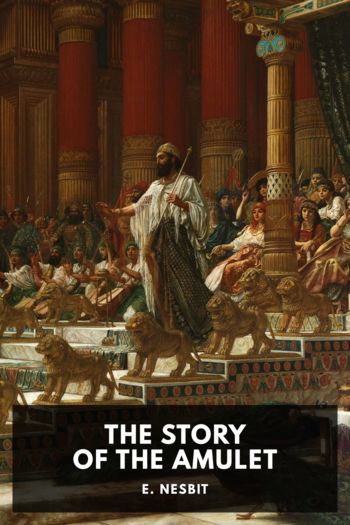Nuclear Winter Series , Akart, Bobby [hot novels to read .txt] 📗

Book online «Nuclear Winter Series , Akart, Bobby [hot novels to read .txt] 📗». Author Akart, Bobby
“Sir, NOAA advises that the upper troposphere temperatures have risen to the point that a temperature inversion is developing,” she said. A temperature inversion was an atmospheric condition in which warm air traps cooler air near the Earth’s surface. As a result, pollutants were trapped below with the cooler air. Erin continued. “This keeps the smog and polluted air at surface levels. Coupled with the increased nitrogen oxides produced by the nuclear detonations, our ozone layer has been severely damaged. More ultraviolet radiation is hitting our planet, which will cause skin and eye damage to all animal life.”
“Erin, when will we bottom out?”
The president wanted her to give a certain date, which she couldn’t. She equivocated, not because she was trying to protect her reputation but because neither she, nor the scientific community, could provide a definitive answer.
“We will experience freezing temperatures across most of the nation above thirty-degrees latitude until late summer of next year, at which time we’ll get a bit of a respite. The remainder of the nation, namely south-central Texas, New Orleans, and much of Florida, will be spared temps below freezing.
“In my opinion, we’ll bottom out about four years or so after that. How well our planet deals with nuclear winter will depend upon several mitigating factors, including the moderating effects of the world’s oceans. The lower latitudes I just described will benefit from the warmer waters coming up from the equatorial regions.”
“Are you saying we won’t see the worst of this for five years?”
“That’s correct.”
“What do we do in the meantime?”
“Consider moving large numbers of Americans to points near the equator or into the southern hemisphere,” she replied before adding, “and pray.”
Chapter Thirteen
Friday, November 1
Arkansas Valley Regional Medical Center
La Junta, Colorado
Sheriff Mobley had hardly slept the night before. He couldn’t put his finger on why the fate of this traveling family weighed on him so much. He made a point to touch base with his own kids and grandchild before turning in for the night. As he tried to fall asleep, he reminded himself how lucky he was to live in a small, close-knit community that most of the world was unfamiliar with.
He thought of the amenities and glamour of living near a big city like San Francisco. The Golden Gate Bridge. Fisherman’s Wharf. The cable cars. As a career law enforcement officer, naturally he’d enjoy visiting famed Alcatraz Island. Yet, today, all of those things were either obliterated or damaged. The people who lived in close proximity to San Francisco Bay perished. And those with the foresight to escape before the blast, like the McDowell family, faced unknown perils regardless.
He awoke around five and immediately dressed for work. His first stop was the sheriff’s office to coordinate the daily shift change. After an update from his deputies, he was pleased to learn that there hadn’t been any new reports of hypothermia cases as a result of the flash freeze. He attributed it to the time of night it had occurred and the fact most of Otero County’s residents were following his admonitions to remain inside to avoid inhaling the nuclear fallout and the soot-filled air.
He arrived at the hospital to check on the McDowell family just as his friend, the attending physician, came in for his fourteen-hour shift. He was standing near the emergency room reception desk, speaking with one of three surgeons the hospital had on staff. He saw Sheriff Mobley arrive and waved him over.
“Shawn, are you here about the McDowells?”
“Yeah. Just wanna see if there’s been any change,” he replied. He said good morning to the surgeon, Dr. Carl Forrest.
“Not yet,” replied his friend. “Listen, I’ve been speaking with Dr. Forrest, who is concerned about the dad’s legs.”
The surgeon furrowed his brow as he addressed the situation. “Shawn, this patient is struggling to fight the effects of hypothermia. His body has been weakened by the frostbite to his lower legs, a condition that is impeding his ability to heal.”
“I assume you need someone’s consent to perform the procedure,” said the sheriff. “Are we approaching a point of no return in which a decision must be made?”
“We may actually be past it,” Dr. Forrest responded. “Long-term effects like congenital malformation and cancer are not even my concern at the moment. Infection and circulatory disorders are beginning to manifest themselves. After the patient’s body was raised to a normal temperature, the threat of traumatic gangrene raised additional concerns.”
“How long can we wait?” asked the sheriff.
Before the surgeon could respond, a nurse came running toward them. “Doctors! The boy is waking up!”
All three men hustled down the long corridor and into the intensive care unit at the back of the hospital. It was segregated from the active emergency room so patients could recuperate, yet it was close enough to have access to the trauma team in the event of a medical problem.
Sheriff Mobley gently grabbed the two physicians by the sleeves to slow their pace. “Guys, let’s not scare the bejesus out of the kid. This young man has some very adult issues to contend with right now.”
The doctors nodded and caught their breath. They casually walked into Tucker’s room with apprehension. Two nurses were making Tucker comfortable and stepped away from the hospital bed to make way for the group.
“Doctors,” began the head ICU nurse, “his vitals remain stable although his heart rate is slightly elevated. He’s been able to drink water on his own although he’s complained of a sore throat.”
The attending physician reached over the bed rail and held Tucker’s hand. “Young man, I’m Dr. Frank Brady. This is Dr. Forrest and Sheriff Mobley. Do you understand where you are?”
As he spoke, he used his penlight to examine Tucker’s eyes and throat. Then, with his stethoscope, he listened to his heart and lungs. Satisfied with the results, he put the instruments away.
Tucker pointed toward





Comments (0)